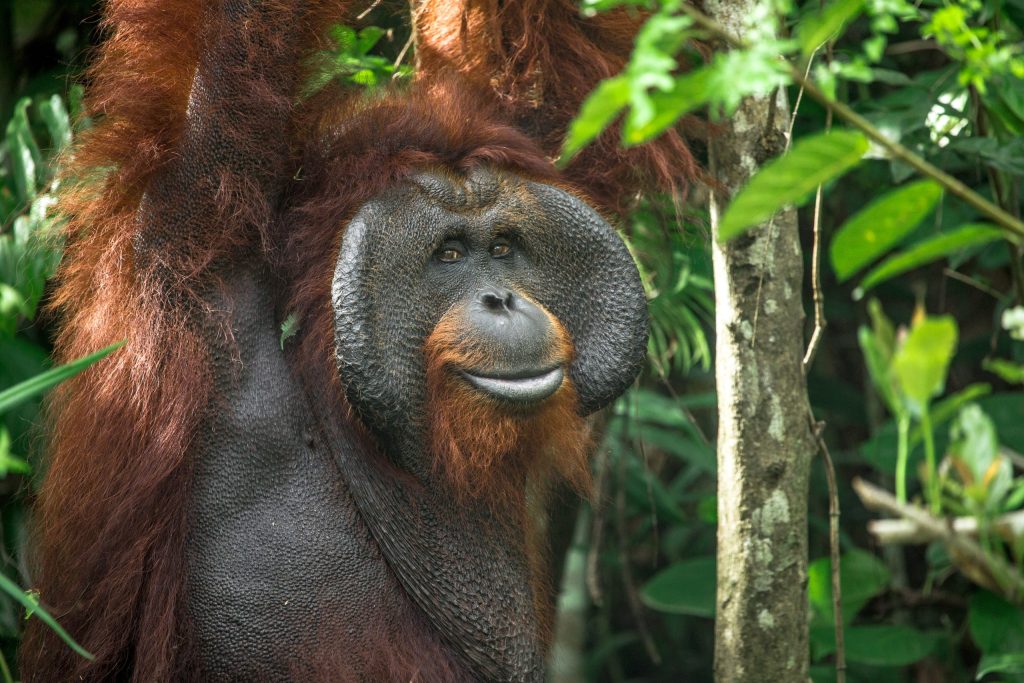MEET OUR LONG TIME RESIDENTS

Can you imagine how difficult it must be for an orangutan to climb trees, forage for food, and build nests – with no arms? Yet, Kopral makes it look easy. He is our superhero and one of 93 unreleasable orangutans in BOS Foundation’s care. Currently, only 11 live on specially created sanctuary islands. But with your help, it can be more soon.
When Kopral arrived at BOS Foundation’s Samboja Lestari Centre in 2009, he was in the most heartbreaking condition. Kept illegally as a pet for the majority of his young life, Kopral made a perilous and futile attempt to escape his captors. After climbing an electricity pole, the four-year-old was severely electrocuted and left for dead for an entire week before his captors finally handed him over. It was truly a miracle that he survived.
The poor male had severe burns to most of his body, and the BOS veterinarians had no choice but to amputate his arms. For four months, he received around-the-clock care and treatment and, through this time, showed us his immense determination and spirit.
Kopral spent the next few years in Forest School, but while he was eager and capable of learning nearly everything that his classmates did, due to his disability, he would never survive on his own in the wild. It would not be fair to release him. However, Kopral was not destined to live his life behind bars. Instead, he was chosen to live on a sanctuary island, where he thrives. You should see him somersaulting, climbing trees, and gathering food, confident and proud like his releasable peers.
- Kopral on his Sanctuary Island.
- Our unreleasable orangutans receive the best care possible.
Several reasons for being unreleasable
While Kopral is an example of our long-time residents with physical disabilities who have acquired sufficient natural skills and behaviours, several other reasons make it impossible for us to return orangutans to the wild. Some individuals were rescued too late in life, lacking the skills needed to survive in the wild and are not able to still learn them because of their advanced age.
Others suffer from illnesses such as tuberculosis or chronic respiratory disease, requiring them to receive daily treatment or remain in isolation as they pose a risk of transmission to the broader orangutan population. And then there are a few that need permanent intensive care due to severe physical limitations, like our completely blind residents or those who miss multiple limbs.
But no matter what stops our unreleasable ones from being able to live a free and independent life in the forest, “they are as amazing as the healthy ones with great personalities, who can still live a happy life, says BOS veterinarian Fransiska Sulistyo.
Our goal is to transfer as many as possible onto sanctuary islands, humanmade river islands, where physically fit but unreleasable orangutans can live semi-wild lives in a forested, controlled environment. The river boundaries keep out predators and prevent the islanders from escaping. In addition, the BOS technicians deliver fresh food twice daily and closely monitor their well-being together with our dedicated veterinary team, who is always on call for emergencies.
- Sanctuary Islands are surrounded by water…
- …so that the oranngutans can’t escape and are protected.
Securing space and funds
However, as wonderful as this sounds, the reality is that we currently don’t have enough space on the existing sanctuary islands for all potential candidates. So, while we prepare more suitably-sized islands, they must wait in caged enclosures (read about our enrichment program below).
Besides space, the biggest challenge in providing sanctuary for unreleasable individuals is securing the funds required. As you can imagine, between the costs for decades of food and medication and the expenses associated with building new, appropriate sanctuary enclosures and islands, providing lifelong care requires more funding than what is needed to put an orangutan through the rehabilitation process.
Here is where we need you, our dear supporters. To kick off the development of 21 new sanctuary islands, we want to raise $150,000 by 30 June 2023. If you can, please support our appeal, so many more of our long-time residents can thrive and roam around freely like our beloved superhero Kopral.
And who knows: There is always the possibility, however small, that some of these orangutans make behavioural progress significant enough to warrant their release in the wild. We continue our work, hoping for this miracle so that every orangutan can live free in their true home, the Bornean rainforest.










